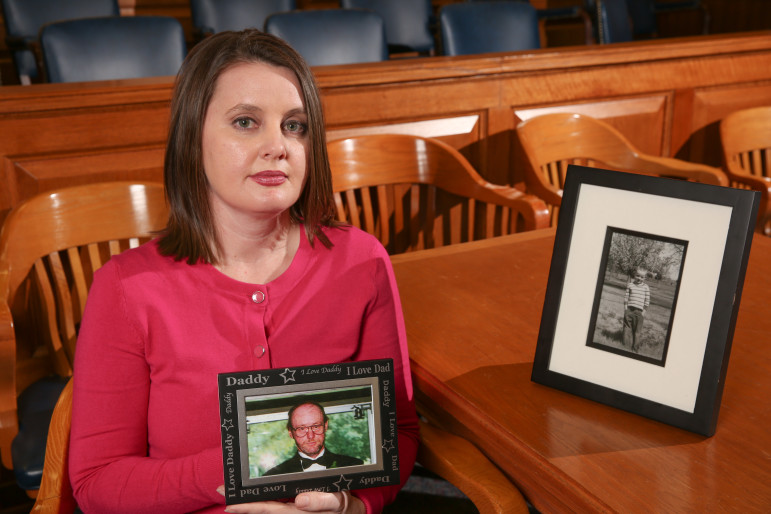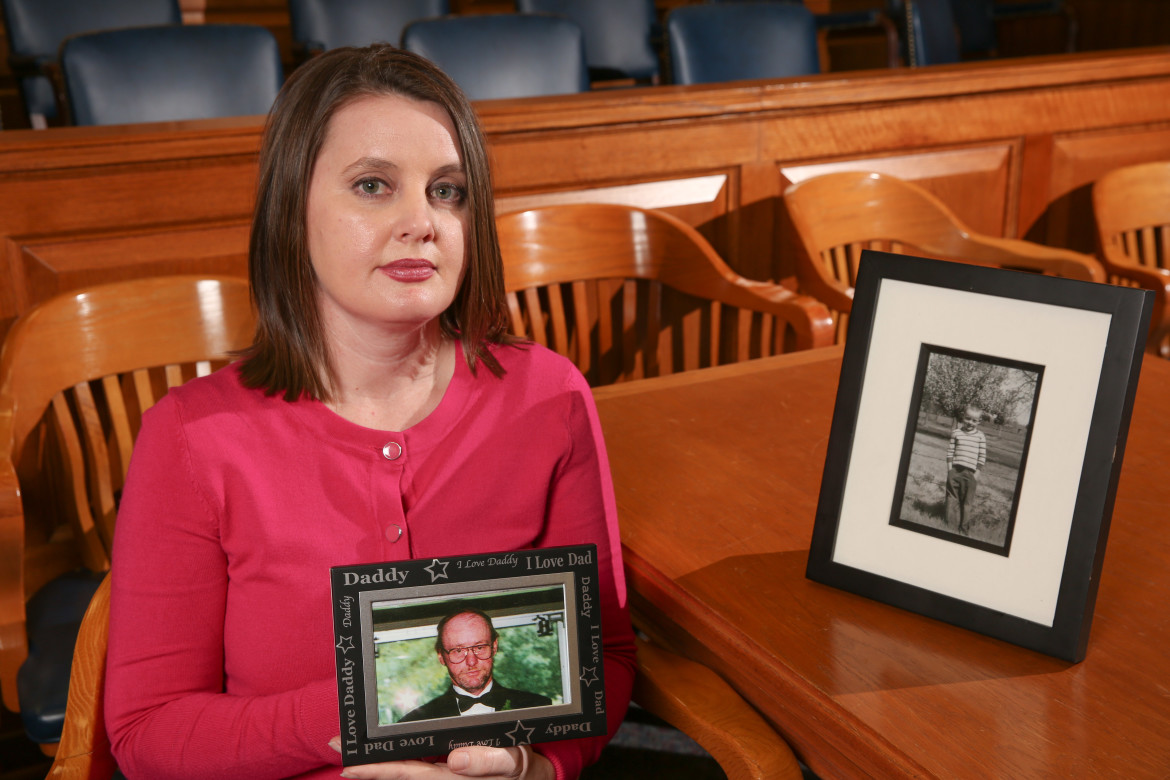
Photo by Michael Mercier
Candy Cheatham holds a photograph of her father as an adult. A photo of him as a child survived the fire set by the teenagers who took his life.
In the nearly four years since the U.S. Supreme Court decided that juveniles can’t be subject to mandatory life-without-parole sentences, hundreds of juvenile offenders have been given a chance at eventual release.
Evan Miller — whose name is on that decision — isn’t one of them.
Miller has been locked up since he was 14 for the July 2003 killing of a neighbor, Cole Cannon. The 52-year-old Cannon was beaten, robbed and left for dead in his mobile home, which Miller and another teen set ablaze to cover up the crime. A jury in his hometown of Moulton, Alabama, convicted him of capital murder in 2006.
 In 2012, the U.S. Supreme Court decided he should get a new sentencing hearing. In January, it ruled that juveniles who previously received mandatory life-without-parole terms should get the same opportunity. But Miller is still waiting for his proceeding in a prison outside Birmingham, leaving not only his family but that of his victim in an emotional holding pattern.
In 2012, the U.S. Supreme Court decided he should get a new sentencing hearing. In January, it ruled that juveniles who previously received mandatory life-without-parole terms should get the same opportunity. But Miller is still waiting for his proceeding in a prison outside Birmingham, leaving not only his family but that of his victim in an emotional holding pattern.
“It’s something that’s kind of hanging over your head,” said Candy Cheatham, Cannon’s daughter. “To me, it’s like revictimization. When we walked out of the courtroom from the trial where he was convicted and given that sentence in 2006, we thought we were done with this part.”
The next date on the docket is another status conference — a perfunctory check-in with the lawyers on either side — at the end of March, said Joy Patterson, a spokeswoman for the Alabama attorney general’s office, which will handle the resentencing. State prosecutors took over from the Lawrence County district attorney’s office because of a conflict — the county’s top prosecutor since 2012 has been Miller’s old lawyer, Errek Jett.
What’s supposed to happen eventually is that Miller will get to go before a judge again, where he’ll be able to present mitigating factors — his youth and a long history of abuse, mental illness and neglect — in hopes of getting a reduced sentence. It’s possible the judge will weigh all those facts and decide to hand down the same sentence, experts say.
But part of the reason Miller is still waiting for his day in court is because Alabama law has yet to be changed to reflect the decision that bears his name, Jett said.
“The Legislature’s not caught up with what you do in those cases,” he said. “It’s sent back to a trial judge right now without any corrections in the law on the books. Today the only option, according to Alabama statutes, is the same thing that was on the books then.”
Bills that would bring state law into line with Miller v. Alabama failed in the last two legislative sessions, Jett said. A third attempt is pending in Montgomery this year.
“With all the other things that go on in Montgomery, I know there’s a whole lot to govern there,” he said. “But in four years’ time, I think it very well could have been addressed.”
Patterson said Alabama’s Supreme Court has set out standards for addressing claims like Miller’s, and the lack of a new law isn’t what’s holding up his resentencing. But the prosecutor’s office didn’t explain why it’s taken nearly four years to bring Miller back before a judge.
It might be smart to wait for the Legislature, “because maybe legislative branch makes a more radical alteration than you anticipated. You wouldn’t want to go through resentencing multiple times,” said Jenny Carroll, a University of Alabama law professor and former defense attorney. And if Miller’s lawyers wanted to speed the process along, they could ask a judge to demand an explanation for the delay, she said.
But they haven’t taken that step — perhaps because they’re using the time to build up Miller’s record for a future court date, said Carroll, who teaches juvenile defense law and criminal procedure. She expects both his attorneys and the state are conducting their own evaluations of Miller in preparation for a hearing.
“How well has he behaved while in custody? What’s his record as a prisoner? Has he done things like further his education? Has he engaged in acts we would consider good acts, to suggest he has in fact been rehabilitated?” Carroll asked. “The more time Miller has to do that, the more likely he is going to able to make a claim that, ‘Not only does my sentence need to be revisited because of the Supreme Court decision, but it needs to be revisited because I was such a radically different person than I was at the time I was sentenced originally.’”
The last proceeding for Miller was a status conference in October 2014, Cheatham said. The last update she got from prosecutors was last June.
“He gets all those appeals, and then he gets his chance to have this second sentence, which is going to be handled like a minitrial,” said Cheatham, a federal probation officer. “It’s like going through a whole trial again. You want to go ahead and get it over with, but it’s not something you want to have to go through.”
Miller’s lawyer, Bryan Stevenson, declined comment for this report. Stevenson is the head of the Montgomery-based Equal Justice Initiative, and he argued Miller’s case before the Supreme Court.
‘I am God’
By the time Miller and his buddy, 16-year-old Colby Smith, found themselves in Cannon’s trailer, Miller had survived years of physical abuse by his father, according to testimony in his trial. He’d attempted suicide four times, starting at age 6.
He’d been placed in foster care at age 10, only to be returned to the custody of his mother, an alcoholic and drug addict, three years later. He started using drugs himself — and the night of the killing, he’d been drinking whiskey, smoking pot and taking the anti-anxiety medication Klonopin.
Miller’s family declined repeated requests for comment for this report. But in 2006, his sister, Aubrey Miller, told the Decatur (Alabama) Daily that her brother should never have been tried as an adult.
 "There are a lot of people responsible for a 14-year-old committing murder," she told the newspaper. "I really believe that my mother and father should share the blame. Not just for that one night without supervision.”
"There are a lot of people responsible for a 14-year-old committing murder," she told the newspaper. "I really believe that my mother and father should share the blame. Not just for that one night without supervision.”
Aubrey Miller added, “He wasn't thinking. No one had taught him to think. We were not taught respect and honesty. My daddy will say he tried to do those things, but you don't beat a child into being honest. My mother loves her children, but she's a poor parent."
Most of the account of what happened that night came from Smith, who pleaded guilty to a lesser murder charge in exchange for a life term with a chance of parole. He testified that he and Miller had planned to steal Cannon’s money and that they smoked weed and played drinking games with him until Cannon passed out.
As they lifted his wallet, Cannon grabbed at Miller’s throat. Smith hit Cannon with a baseball bat — then Miller did, telling the man, “I am God, I've come to take your life.” They set Cannon’s trailer ablaze, leaving with $300 and his baseball card collection.
A typical capital murder case in Alabama is broken up into two parts. In the first, a jury decides whether the defendant is guilty of the death-penalty offense. If so, prosecutors and the defense present more testimony to argue for either a sentence of death, which requires at least 10 votes on a 12-member jury, or life without parole.
But before Miller went to trial, the U.S. Supreme Court decided in Roper v. Simmons that juvenile death sentences were unconstitutional. Jett said in an interview that that decision left only one possible sentence for Miller when the guilty verdict came down.
Jett, who was appointed to defend Miller, incorporated the kind of testimony that normally would have been included in a penalty phase in Miller’s defense. He included expert testimony that Miller, “being 14 years old, didn’t have the mental capability of an adult to think like me or you.” He didn’t appear to understand his Miranda rights when questioned by police, a psychologist testified. And his mother recounted the family’s troubled history.
“I think it was undisputed as to what the evidence was regarding his childhood,” Jett said from his office in Moulton. But the jury rejected his arguments.
The need for a stiff sentence in Cannon’s killing “is beyond question,” Justice Elena Kagan wrote in the Supreme Court’s 6-3 decision. “But once again, a sentencer needed to examine all these circumstances before concluding that life without any possibility of parole was the appropriate penalty.”

Prison Reform.com
Evan Miller is still waiting to be resentenced by a judge in Lawrence County.
‘Some of the states just don’t want to do it’
Before the Miller decision, an estimated 2,500 inmates who were under 18 at the time of their crimes were serving life-without-parole terms, said Ashley Nellis, senior research analyst at The Sentencing Project, a Washington-based nonprofit that advocates for sentencing reform.
In the decision’s aftermath, many states changed their laws or granted inmates the right to a parole hearing one day.
Nine states abolished the penalty for juveniles altogether after Miller, and California and Florida — two of the states where the sentence was most commonly handed down — sharply restricted its imposition, according to a 2015 report by the nonprofit public-interest law firm Phillips Black. The report found that a quarter of life-without-parole sentences were handed down in a handful of cities, including Philadelphia, Chicago, Houston and New Orleans.
But other states challenged whether the ruling applied to offenders who’d been sentenced before the Miller decision. That led to January’s follow-up decision, Montgomery v. Louisiana, which clearly stated that it did.
After Miller and Montgomery, as many as 2,000 inmates will now be looking to judges or legislators for their chance at parole, Nellis said. Some — like Henry Montgomery, who was convicted of killing a sheriff’s deputy in Louisiana in 1963, when he was 17 — have been locked away for decades.
“You have to look at people individually, based on their individual characteristics, and pay particular attention to their young age,” Nellis said. The estimates of how many qualify for resentencing vary. “But regardless of what the count is, they all will deserve this thorough and comprehensive review,” she said.
The juvenile life-without-parole decisions don’t completely eliminate the sentence: They just bar its automatic application in cases like Miller’s. For those who do go back before a judge, it’s possible that they will be given the same sentence after their circumstances are reconsidered. But, Nellis said, the language of the decisions makes it clear that the penalty should be “extremely rare.”
“I think a judge that actually reads the ruling and incorporates its tone couldn’t help but consider giving these folks an opportunity for release. Life without parole forecloses that opportunity,” she said.
Miller’s appeal was decided alongside that of Kuntrell Jackson, an Arkansas 14-year-old sentenced to life without parole in the killing of a video-store clerk during a holdup in which Jackson remained outside the shop. Jackson was resentenced to a 20-year term in April 2014 — six months before the most recent hearing for Miller. The Arkansas Legislature changed its relevant law in 2013.
Nellis said she isn’t surprised that Miller is one of those still waiting for one of those reviews.
“That’s why we had to go back for the Montgomery ruling to begin with, when it seemed clear to everybody that this was a retroactive ruling,” she said. “Some of the states just don’t want to do it.”
In Miller’s appeal to the U.S. Supreme Court, Alabama Attorney General Luther Strange had argued that the “heinousness” of Miller’s crime “demonstrates the rare circumstance under which a life without parole sentence is appropriately imposed on such a young defendant.” After the 2012 decision, Strange said, “We respect the Court and will of course follow its decision, but we profoundly disagree with its reasoning and result.”
In a written statement after the ruling, he said, “Miller will have a new sentencing hearing, but in light of the facts of his case, the prosecution will have a compelling argument that he should receive a life-without-parole sentence.”
Strange’s response to the Montgomery decision was far more pointed, calling it “the latest in a series of truly irresponsible rulings” that he said “undermine the rule of law and directly attack the rights of murder victims.”
In a statement condemning the decision, he said, “In Alabama alone there are at least 70 convicted murderers serving life-without-parole sentences who could be granted the chance for a new sentence and possibly parole. I will stand with murder victims and their families and work with local district attorneys to ensure that these murderers serve out their sentences.”
And as her family awaits a new courtroom encounter with Miller, that part rankles Cheatham, too.
“We know it’s something that’s coming. We don’t know when it’s coming, and now with the Montgomery case, it’s retroactive for everyone,” she said. “The day we got that news that was just as devastating for me. We knew we still had to have it, but now everybody has to go through that hurt like us … It just does not feel like justice for me.”

When is Colorado going to begin with it’s 49 former juveniles.
One I know of was not even there and was found innocent of murder
One was way off in the area and did not know what was going down.
How can WE find some justice???
Judith Cain
I represented John Czere III when he was 16 in 1978 and was sentenced to consecutive life sentences with a minimum of 40 years parole eligibility for each count. He has now been in prison for 38 years and is working with local counsel in Louisiana to meet the standards set forth in the Montgomery case. A long a difficult road to traverse.
I wrote a novel about his case – Runaway: A Tragedy of Youth. Another in a long series of examples of travesties of justice for juveniles.
Hello Mr. Alpert. this is John Czere. I have been trying to contact you since my release on March 8th. Please either e-mail me, or contact Mr. Weixler. He has my phone number. I have tried calling your number, but without any success.